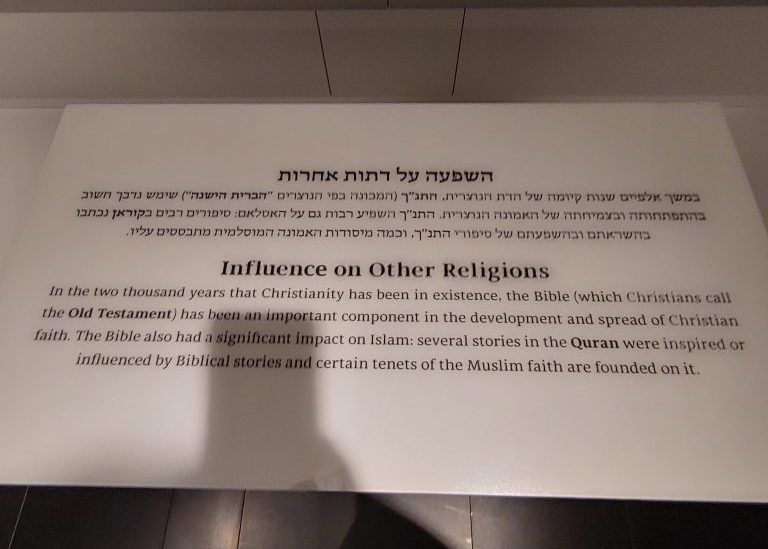Text Panel
In the two thousand years that Christianity has been in existence, the Bible (which Christians call the Old Testament) has been an important component in the development and spread of Christian faith. The Bible also had a significant impact on Islam: several stories in the Quran were inspired or influenced by Biblical stories and certain tenets of the Muslim faith are founded on it.
More Info
Before us, we see a collection of translated Bibles from around the world. The Jewish Bible was originally written mostly in hebrew — and a bit in Aramaic, a language that was (and still is) spoken by a relatively small community.
However, already in antiquity, the Bible was rendered into other languages, thereby embarking on a journey to become the most popular book in the world. As of today, the Bible has been translated, in full, into roughly 350 languages, and, in part, into more than 2,000.
This translation work continued into the modern age with such projects as the Arabic translation, named for the 19th century Dutch scholar Cornelius Van Dyck, and the 20th century Chinese translation into Mandarin. Rendering the Bible accessible to all has also prompted a Braille edition for the visually impaired.
Some ancient versions, like the Latin Vulgate, prepared by Saint Jerome, or the translation into Geʽez (Classical Ethiopic), contain books that have since been lost, and which therefore survive only in translation. Such ‘lost books’ remain among our most important sources for learning about the literature composed during the Second Temple period and the generations that followed.
In many languages, the Bible was the first book to be committed to writing, and very often it has become the cornerstone of literature and culture. Martin Luther translated the Bible into German, leaving an indelible mark on German society. Later, during the 17th century, england’s King James I attempted to heal the wounds of prolonged religious wars between Catholics and Protestants, and so, under his auspices, a new english version was composed with the cooperation of various denominations.
Through its numerous translations into various world languages, the Bible exceeded the confines of its original, hebrew language, and thereby transcended the cultural horizon of the Jewish People, becoming a foundational text in the cultural history of human civilization.

